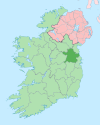Rathmolyon
Rathmolyon
Ráth Moliain | |
|---|---|
Village | |
 St. Michael's and All Angels Church, Rathmolyon | |
| Country | Ireland |
| Province | Leinster |
| County | County Meath |
| Elevation | 76 m (249 ft) |
| Population (2006) | |
| • Total | 168 |
| Time zone | UTC+0 (WET) |
| • Summer (DST) | UTC-1 (IST (WEST)) |
| Irish Grid Reference | N833483 |
Rathmolyon /ræθmɒˈlaɪn/, rath-muu-LEYEN, Irish: Ráth Máigh Laighin, meaning 'ringfort of the Leinster Plain') is a village in the southern portion of County Meath, Ireland, situated 8 km south of Trim. It is situated at the junction of the R156 regional road and the R159 regional road connecting Trim to Enfield. Rathmolyon serves as a service center for the surrounding rural area.
Public transport
Bus Éireann route 115A provides a commuter link from Rathmolyon to Dublin via Summerhill and [Dunboyne] with one journey in the morning and an evening journey back every day except Sunday.[1] Until 24 August 2013 (incluive) Bus Éireann route 118 provided a daily commuter service from to/from Dublin via Dunboyne and a daily service to/from Mullingar.
Local history
The village developed at the junction of two regional roads. Most of the significant older buildings in the village date from the Georgian and Victorian periods. During the late 19th century, the area played an important role in the development of the Two by Twos and Cooneyite movement,[2] the only religion known to have had its origin in Ireland.[3]
Although small, Rathmolyon includes some impressive buildings, which include a Catholic church, a Protestant church, two public houses, Cherryvalley House, Rathmoylon Villa and Rathmoylon House.[4]
Local attractions
The "Rathmolyon Esker" east of Rathmolyon has been proposed as a Natural Heritage Area.
See also
References
- ^ http://www.buseireann.ie/inner.php?id=247#Meath
- ^ Dair Rioga Local History Group, Mallon and Greaney editors. 2005. All in Good Faith: A History of Christianity in Enfield, Rathmolyon, Rathcore and Associated Areas. Ireland: Dair Rioga Local History Group and the Meath Leader under the NRDP Programme of the Department of Community, Rural and Gaeltacht Affairs / National Development Plan.
- ^ Robinson, James. 2005. Pentecostal Origins: Early Pentecostalism in Ireland in the Context of the British Isles: Studies in Evangelical History and Thought. Milton Keynes, United Kingdom: Paternoster, p. 34. ISBN 978-1-84227-329-6
- ^ Meath County Council. 2008. Rathmolyon Draft Local Area Plan. Navan, Ireland: Meath County Council. PDF

